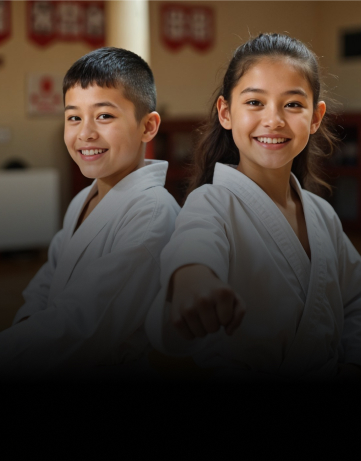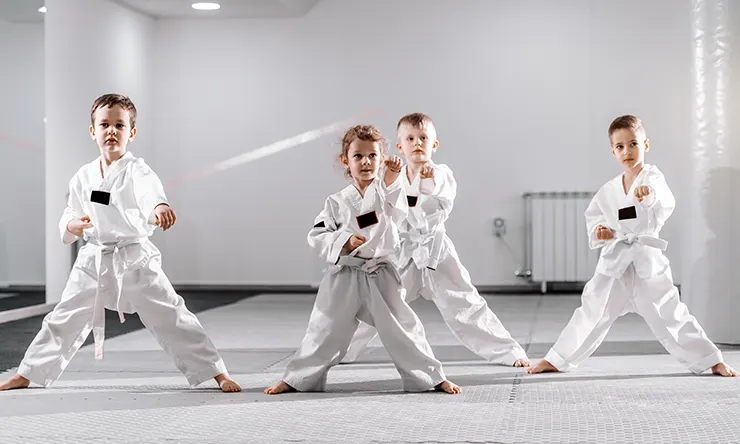How Karate for Children Can Boost Self-confidence and Self-control in Young Martial Artists
Karate for youngsters provides an unique possibility to build self-confidence and discipline in young martial artists. As they learn new techniques and face difficulties, they not only gain abilities but additionally establish a strong feeling of self-regard. This structured environment encourages them to respect the trip of improvement. However how does this training equate into their everyday lives? Discover the deeper links that make karate greater than just a sporting activity.
The Relevance of Confidence in Childhood Growth
Confidence is an important structure block in childhood growth. When you support your youngster's self-worth, you encourage them to face obstacles, take risks, and express themselves freely. Youngsters with self-confidence are extra happy to check out social situations and brand-new activities, which can result in lasting relationships and beneficial experiences.Encouraging your child to get out of their comfort area fosters strength. They discover that failing isn't the end however instead a tipping stone to success. By celebrating their accomplishments, no issue just how little, you aid them acknowledge their abilities and worth.In this journey, assistance and favorable reinforcement from you play an essential duty. Whether it's via praise or simply being existing, your involvement increases their confidence. As they grow, this self-assurance becomes a long-lasting asset, furnishing them to navigate both obstacles and chances with a solid sense of self.
Exactly How Martial Arts Teaches Self-control and Focus
Martial arts helps you develop discipline and emphasis through its organized training regimen. As you practice mindfulness during each session, you'll discover to concentrate far better both on and off the floor covering. Plus, establishing and attaining objectives in karate enhances your ability to remain alert and committed.
Structured Training Program
While you involve in karate training, you'll quickly find how a structured regimen imparts self-control and focus in young experts. Each course follows a particular style, including warm-ups, technique method, and sparring. This uniformity shows you to devote and respect the process to improvement. As you find out methods and kinds, you develop a feeling of obligation for your own progress.The organized environment encourages you to set goals, whether mastering a brand-new belt or perfecting a kata. You'll locate that remaining focused during drills and courses hones your focus. The technique you grow in karate extends past the dojo, favorably influencing your schoolwork and day-to-day routines. Each session reinforces the relevance of dedication, assisting you become a much more self-displined individual.
Mindfulness in Method
As you exercise martial arts, you'll locate that mindfulness becomes an important part of your training. Each relocation needs your complete interest, helping you remain focused on today moment. You'll find out to tune out diversions and focus on your breathing, activities, and purposes. This enhanced awareness sharpens your reflexes and enhances your discipline.During sparring or types, you'll find the relevance of being psychologically present - Karate Salisbury MD. You'll discover how this emphasis not only improves your strategy however additionally constructs your confidence. By practicing mindfulness in martial arts, you grow perseverance and durability, crucial qualities that expand past the dojo. In this means, martial arts shows you to harness your mind, assisting you create a disciplined method to difficulties both on and off the floor covering

Personal Goal Setting Techniques
Setting objectives in martial arts isn't just about earning belts; it's an effective method to cultivate technique and emphasis. When you set certain, attainable targets, you produce a roadmap for your progression. As an example, as opposed to simply intending to enhance your kicks, attempt concentrating on grasping a specific strategy monthly. This technique keeps you motivated and engaged.Breaking down bigger objectives right into smaller sized, convenient steps assists you track your development and commemorate tiny victories in the process. Whether it's improving your stance or increasing your sparring endurance, every objective strengthens your commitment. As you achieve these objectives, you'll build self-confidence in your skills and develop a solid sense of technique that extends beyond the dojo right into daily life.
Building Resilience With Martial Arts
Fighting style, particularly martial arts, provides youngsters an one-of-a-kind opportunity to build strength in a supportive setting. In courses, they encounter challenges that press their limitations, whether it's competing or understanding a brand-new strategy with a partner. Each setback, like a missed kick or a lost suit, comes to be a possibility to find out and grow.As they exercise, children learn to accept discomfort and keep trying, also when points obtain difficult. They discover that failure isn't completion; it becomes part of the trip. This attitude aids them get better more powerful, not just in the dojo, yet in day-to-day life.With each challenge they overcome, your kid develops confidence in their capability to deal with obstacles, sustaining their resolution. Via karate, they'll understand that strength isn't practically physical strength; it's about mental grit and determination, empowering them to face whatever life throws their way.
The Duty of Regard in Karate Training
Regard is a foundational concept in karate training, cultivating a society of discipline and camaraderie amongst students. When you tip onto the dojo flooring, you're not just learning techniques; you're additionally learning to appreciate your trainers, peers, and the art itself (Karate Salisbury MD). Bowing at the beginning and end of course isn't simply a rule; it signifies your acknowledgment of others' dedication.as and initiatives you create mutual respect, you'll locate it boosts your learning experience. You'll listen a lot more diligently to your teacher and gain insights from fellow trainees. This environment urges constructive objection and support, allowing everyone to expand together.Moreover, respect grows self-discipline. Identifying the worth of hard work and humbleness assists you remain concentrated on your training. In turn, this regard equates right into your daily life, improving your communications and relationships outside the dojo. Through karate, you discover that regard is important for personal development and area structure
Achieving and establishing objectives Success in Martial arts

Social Abilities and Team Effort in the Dojo
While training in the dojo, children normally create essential social abilities and team effort abilities. As they practice along with peers, they find out to interact successfully, share space, and assistance each other. Each class offers opportunities for cooperation, whether it's throughout partner drills or group exercises. This teamwork cultivates friendships and develops a sense of belonging, making the dojo a nurturing environment.Kids also gain beneficial conflict resolution skills. When they experience challenges, such as disagreements throughout sparring, they discover to navigate these scenarios constructively. They practice persistence and compassion, understanding that every person has various staminas and weaknesses.Moreover, taking part in group activities cultivates a sense of liability. You'll see your youngster finding out to count on colleagues and take obligation for their function in a team. These experiences not only improve their martial arts journey however also equip them Family Martial Arts with social devices they'll carry into various other locations of life.

The Long-Term Advantages of Karate Beyond Childhood
As children grow up and change into the adult years, the advantages of martial arts prolong much past the dojo. You'll discover that the self-control and emphasis found out with martial arts can convert into your academic and professional life. Setting and accomplishing objectives in martial arts fosters a strong work ethic, which can press you to succeed in any type of endeavor.Moreover, the confidence gained from mastering strategies and sparring can enhance your self-confidence, aiding you take on difficulties head-on. This strength becomes very useful as you encounter the uncertainties of adulthood.Additionally, the social abilities developed through teamwork and sociability in the dojo can cause much better relationships in both expert and individual balls. You'll find out to communicate effectively, willpower conflicts, and develop a supportive network.Ultimately, karate shapes not simply proficient martial musicians, however well-rounded individuals all set to handle the world.
Regularly Asked Concerns
What Age Is Ideal to Start Karate for Children?
You can start karate as very early as age 4 or 5, but it typically relies on your youngster's maturity and passion. Locating a course that matches their age and energy level makes a big difference.
Are There Any Kind Of Health And Wellness Perks From Exercising Martial Arts?
Yes, exercising karate offers various health benefits. You'll enhance your versatility, stamina, and coordination while boosting cardio fitness. Plus, it improves emphasis and psychological wellness, making it a great selection for total physical and psychological health and wellness.
Just How Frequently Should Kids Participate In Martial Arts Classes?
You should encourage your children to go to karate classes a minimum of 2 to 3 times a week. Consistency helps them learn techniques properly and create abilities, making their experience much more gratifying and enjoyable in the long run.
Can Karate Assist With Handling Anxiety in Kid?
Yes, martial arts can aid handle anxiety in children. It shows emphasis and self-constraint while supplying a risk-free electrical outlet for energy. You'll discover your kid growing much more certain and calm as they exercise routinely.
What Equipment Is Required for Kids Beginning Karate?
